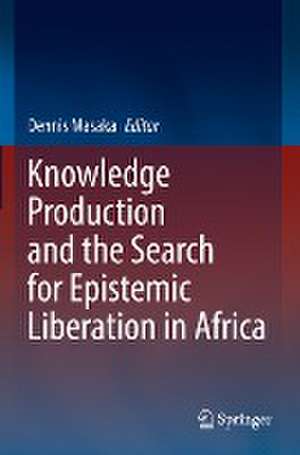Knowledge Production and the Search for Epistemic Liberation in Africa
Editat de Dennis Masakaen Limba Engleză Paperback – 11 sep 2023
| Toate formatele și edițiile | Preț | Express |
|---|---|---|
| Paperback (1) | 637.78 lei 6-8 săpt. | |
| Springer International Publishing – 11 sep 2023 | 637.78 lei 6-8 săpt. | |
| Hardback (1) | 643.99 lei 6-8 săpt. | |
| Springer International Publishing – 10 sep 2022 | 643.99 lei 6-8 săpt. |
Preț: 637.78 lei
Preț vechi: 750.33 lei
-15% Nou
Puncte Express: 957
Preț estimativ în valută:
122.08€ • 132.65$ • 102.61£
122.08€ • 132.65$ • 102.61£
Carte tipărită la comandă
Livrare economică 21 aprilie-05 mai
Preluare comenzi: 021 569.72.76
Specificații
ISBN-13: 9783031079672
ISBN-10: 3031079671
Ilustrații: X, 233 p. 5 illus., 4 illus. in color.
Dimensiuni: 155 x 235 mm
Greutate: 0.35 kg
Ediția:1st ed. 2022
Editura: Springer International Publishing
Colecția Springer
Locul publicării:Cham, Switzerland
ISBN-10: 3031079671
Ilustrații: X, 233 p. 5 illus., 4 illus. in color.
Dimensiuni: 155 x 235 mm
Greutate: 0.35 kg
Ediția:1st ed. 2022
Editura: Springer International Publishing
Colecția Springer
Locul publicării:Cham, Switzerland
Cuprins
Chapter. 1. Introduction.- Chapter. 2. Epistemicide’ and Epistemic Emancipation in Africa – Problems and Promises.- Chapter. 3. Knowledge production and the Liberation agenda in Africa.- Chapter. 4. Decolonisation as self-recovery: the path to intellectual independence.- Chapter. 5. Colonial legacy and knowledge production in Africa: Re-echoing the need for epistemic decolonisation.- Chapter. 6. A critical exposition of ‘alternative’ site(s) of knowledge production in Africa: Decentering the African university.- Chapter. 7. African Epistemic liberation through knowledge democratisation.- Chapter. 8. How African Logic can dissipate the Question of Originality and Knowledge Production in Africa.- Chapter. 9. Africanising Institutional Culture: What Is Possible and Plausible.- Chapter. 10. 'Africa’s Knowledge and the Quest for Epistemic Liberation in a COVID-19 Crisis.- Chapter. 11. Religiosity and African Epistemology.- Chapter. 12. Ukama ethic and Covid-19 pandemic: Countervailing social distancing-induced exclusive individualism in (southern) African university.- Chapter. 13. African Indigenous Knowledge and the management of COVID-19 pandemic.- Chapter. 14. African Knowledge Systems: Shona Paremiology in Promoting Morals, Peace and Human Security.- Chapter. 15. A Yòrùbá Worldview on the Compatibility of Human and Nonhuman Animal Relations (HAR) with Environmental Sustainability.
Notă biografică
Dennis Masaka obtained a doctorate in Philosophy from the University of South Africa in 2016. He is a senior lecturer in the Department of Philosophy and Religious Studies at Great Zimbabwe University in Zimbabwe. He is also a Research Fellow in the Department of Philosophy at the University of the Free State, South Africa (2019-2023). His research interests are in knowledge production in Africa, philosophy of liberation, decolonisation and epistemic justice. He has published a number of papers in reputable journals such as Social Epistemology, South African Journal of Philosophy, Philosophical Papers, African Identities Journal, Journal of Black Studies, Education as Change, African Study Monographs, Journal of Negro Education, Theoria: A Journal of Social and Political Theory, Alternation Journal, Journal on African Philosophy & CODESRIA Bulletin.
Textul de pe ultima copertă
This book shows the importance of knowledge production using requisite terms and frameworks to the broader scheme of epistemic liberation in Africa. The text considers what this veritable direction to knowledge production would mean to other areas of concern in African philosophy such as morality, education and the environment. These contributions are important because the success of decolonising projects in African countries depend upon the methods that underpin envisioned liberative knowledge production in light of Africa’s historical and present condition. This volume appeals to students and researchers working in epistemology and African philosophy.
Caracteristici
Covers the problematic methodological issues in the construction of veritable knowledge in Africa Brings together scholars from diverse backgrounds Liberates from prevailing alien narratives, terms and frameworks
